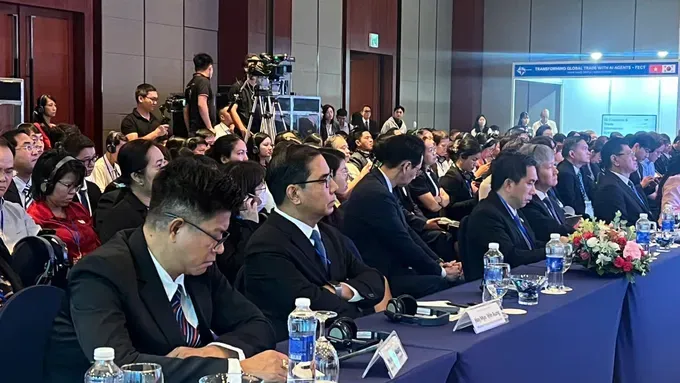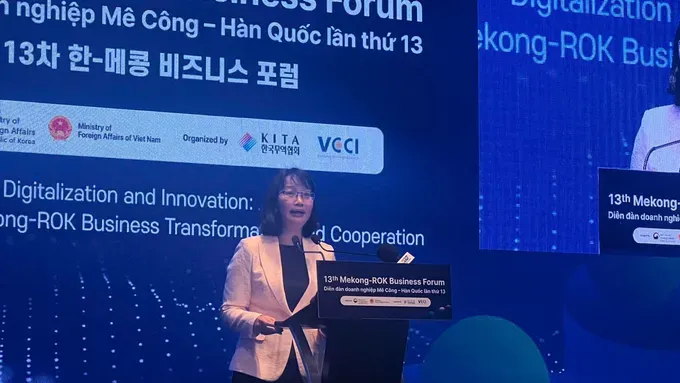
The 13th Mekong-Korea Business Forum commenced this morning in Ho Chi Minh City, bringing together government officials, trade promotion agencies, and business leaders from the Mekong region and Korea.
In his welcoming address, Vice President Vo Tan Thanh of the Vietnam Chamber of Commerce and Industry (VCCI) highlighted the forum’s significant role since its inception in 2013. Rotating annually among member countries, the forum has become a vital and effective mechanism for economic cooperation.
Over its 12 previous sessions, the forum has successfully built a broad cooperation network, facilitated numerous investment and trade projects, and contributed positively to the overall development of the region and the strengthening of Mekong-Korea relations.
Mr. Vo Tan Thanh acknowledged that the current global economic landscape presents a mix of opportunities and challenges. While facing slowing growth, heightened uncertainty, and the restructuring of global supply chains, the world is also experiencing new drivers for development through the Fourth Industrial Revolution, digital transformation, and innovative business models.
He emphasized that this year’s theme ‘Digitalization and Innovation: The Key to Driving Mekong-Korea Business Transformation and Cooperation’ is both timely and strategic. It represents a crucial pathway for regional countries and their business communities to navigate challenges, capitalize on opportunities, and achieve inclusive and sustainable growth.
A representative from the Korea International Trade Association noted Korea's long-standing global leadership in technology, particularly in information and communications technology, artificial intelligence, semiconductor design, e-commerce, and smart logistics.
According to the representative, these sectors have established Korea’s global competitive advantages and address the pressing needs of Mekong countries, including Vietnam. With over 5,000 active startups and major corporations like Samsung, LG, SK, and Hyundai, Korea can offer invaluable knowledge and experience to help regional businesses enhance their digital capabilities and integrate more deeply into high-value supply chains.

As the locality host, Vice Chairwoman of the Ho Chi Minh City People's Committee Tran Thi Dieu Thuy affirmed that holding the forum in the city is not only an honor but also an opportunity to demonstrate its commitment to accompany the business community.
"Ho Chi Minh City is vigorously implementing resolutions on the development of science and technology, innovation, and digital transformation, with the goal that by 2030, the digital economy will account for 40 percent of Gross Regional Domestic Product. The city is committed to accompanying, listening to, and supporting Mekong–Korea enterprises to foster effective cooperation and sustainable growth," she emphasized.
According to Vice Chairwoman Tran Thi Dieu Thuy, in the context of ongoing global economic fluctuations, cooperation between Mekong countries and Korea to promote digital transformation, develop smart supply chains, and encourage innovation not only addresses immediate needs but also lays the foundation for long-term breakthroughs. She stressed that the forum should serve as a bridge to help enterprises identify the right partners, capital, and markets, while expanding public–private cooperation to strongly support start-ups and small- and medium-sized enterprises. Only then will cooperate projects truly generate high added value and deliver benefits across the region.
Ho Chi Minh City is not only the nation’s economic and financial hub but also a leader in start-ups, innovation, and foreign investment attraction. The city is emerging as a promising environment for green and digital transformation projects, particularly as Vietnam sets its goal for the digital economy to contribute at least 30 percent of the national Gross Domestic Product by 2030. With advantages in infrastructure, human resources, and a rapidly growing start-up ecosystem, Ho Chi Minh City is expected to play a pivotal role in connecting Korean businesses and Mekong countries to effectively implement cooperation projects in high technology, smart logistics, and e-commerce.
























